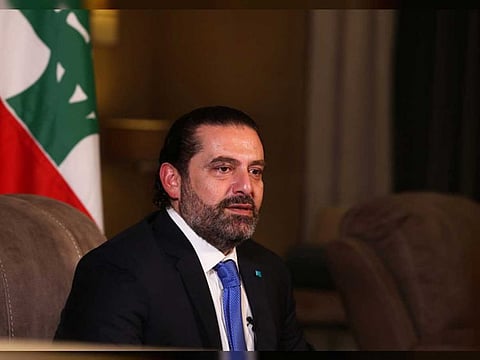Is Saad Hariri staying away from Lebanon’s March election?
Even if Future Movement doesn’t take part in polls, members may run as independents

All the Lebanese parties are bracing themselves for the upcoming parliamentary elections, scheduled for 27 March 2022. Politicians are appearing daily on television programs, making their usual campaign promises, promising accountability for corruption, unlocking of locked depositor bank accounts, and electricity.
Party flags are being hoisted in their respective constituencies: orange for the Free Patriotic Movement (FPM) of Gibran Bassil, yellow for Hezbollah, green for the Amal Movement. The blue flag of the Future Movement is visibly absent from early campaigning in Beirut, amid high speculation that its leader, Saad Al Hariri won’t be running for office next March.
This has prompted his friend and ally, ex-Prime Minister Fouad Siniora, to visit him, seeking clarifications. Hariri said that he will make an announcement upon returning to Beirut this month.
He has made it clear to supporters, however, that even if the Future Movement doesn’t take part in the elections, they are free to nominate themselves as independents. His sudden withdrawal from politics, comes just four months after he declined to form a government, and it has left the Sunni community that he heads both confused and worried.
No familiar names
If Hariri doesn’t run for parliament then nor will Fouad Siniora or any of the prominent Sunnis from the Future Movement, like ex-Interior Minister Nouhad Machnouk. Former Prime Minister Tammam Salam, scion of a leading Sunni family in Beirut, will also refrain from returning to Parliament.
The only Sunni figures campaigning next March will be either independents, members of Prime Minister Najib Mikati’s Azm Movement, or those affiliated with the Hezbollah-led March 8 Coalition, like Faisal Karami of Tripoli and ex-Defense Minister Abdul Rahim Murad.
Lack of funds
There are many reasons behind Hariri’s decision to walk-out on the elections, high among which is lack of funds to bankroll a nationwide campaign for him and his followers. Last summer he said it bluntly during an interview with Al Jadeed TV: “I used to be a billionaire but I no longer am.” Much of that wealth was spent on domestic politics after he decided to become his father’s political heir and successor, back in 2005.
The rise of Bahaa Al Hariri
But more worrying than both restrictions is the mushrooming political ambition of his elder brother Bahaa, who is entering Lebanese politics next March through a list of Sunni figures—some being former members of the Future Movement.
Unlike Saad, Bahaa has not wasted his inheritance from the business empire of their father, the late Rafik Al Hariri. According to Forbes, his net worth stands currently at $2 billion, with plenty of funds at his disposal to lure voters and market himself as the new leader of Lebanese Sunnis, just like his father did when he debuted in the early 1990s.
Unlike Saad, the Boston University-educated Bahaa has taken a particularly tough position on Hezbollah, which is music to the west and to Saudi Arabia. His ambition has been rising steadily since he debuted politically two years ago, supporting citywide protests that toppled his brother’s third cabinet, back in October 2019.
His current campaign list “Sawa Li Lubnan” is already raising billboards across Beirut, ahead of the March elections. While Saad has closed down his media outlets like Future TV and Al-Mustaqbal newspaper, which were essential for previous campaigns (due also to shortage of funds) Bahaa is campaigning through his online Sawt Beirut International platform, which is broadcasting on satellite television via LBC.
He has also hired an Australian political consulting firm called CT Group to plan his campaign strategy, and Sawa li Lubnan has already set up ten offices across the country, with headquarters in Downtown Beirut—a posh neighborhood rebuilt by Rafik Al Hariri and long considered his pride and joy.
Bahaa Al Hariri won’t be running for office in March, however, preferring instead to usher a list of supporters and allies into parliament. When that happens, Bahaa will become a force in Lebanese politics, a small but developing one, driving a wedge both within the Sunni community and inside his brother’s Future Movement.
These are hard times for Saad Al Hariri and it might be better for him to sit back and watch, rather than immerse himself in a confrontation that he might no longer be capable of winning.
Sign up for the Daily Briefing
Get the latest news and updates straight to your inbox


